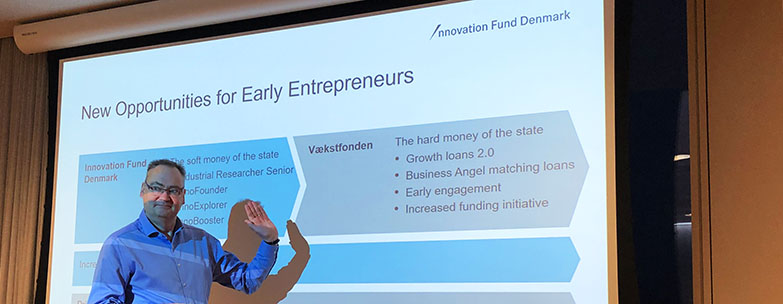Seasoned investors shared pitching tips with startups
The angel investor looks for start-ups that require special skills. The institutional investor looks for start-ups that promise growth and employment. Both look for quality, value creation and an ability to execute. Those, in a nutshell, were the takeaway messages of a “Brew Your Own” event on December 3rd. 2019 hosted and co-created by Copenhagen Science City and Biopeople.
Business critical information and networking opportunities
“Brew Your Own” is a new series of events dedicated to combining useful information for start-ups with networking opportunities between deep-tech entrepreneurs, and researchers and students who dream of starting a business or joining a start-up. For the December version, the organizers had invited angel investor Lars Arne Christensen and innovation Fund Denmark soft funding investor Lars Winther along with the founders of start-ups Scandion Oncology, Riid and BIRanalyzers.
One hundred and ninety five angels
Christensen is a member of Danish Business Angel Network (DanBan). He explained that DanBan is a network of 195 private investors who have each pledged to invest 3 million DKK in technology-based early stage start-ups. The angels focus on young entrepreneurs and define “Early stage”, as companies that have a feasible technology, but still need to show that customers want it.
Business ideas should be hard to do
DanBan typically invest between one and five million DKK and parcel all their investments out to syndicates of investors. They do this to spread the risk, and to pool the experiences that the start-ups can draw from. On average they process ten applications per week, and look for business ideas that will add real value, that are hard to do, that show global promise and a possibility of becoming market leaders and that aim for one billion DKK markets.
Easy way to improve succes rate
As a representative of Innovation Fund Denmark, Winther presented three specific investment instruments for early stage start-ups: The innofounder, innobooster and innoexplorer programmes. In 2020, the fund plans to invest a total of two billion DKK in so-called soft funding for innovation programmes. All their programmes aim to encourage knowledge-based growth and employment in Denmark. The success rate of applications for Innobooster is around 25 percent… Which is not as high as it could be.
We get applicants that want funding for starting hairdressers or saving polar bears. We can only invest in projects that assure knowledge based growth and employment. If all our applicants would read the d*mned guidelines and submit knowledge based propositions, our success rate would be more like 50 percent”: Lars Winther, Senior Scientific Officer, Innovation Fund Denmark.
Good chance you won’t blow it
Winther encouraged applicants, especially within the life science sector, to know their market, address legal and regulatory issues, plan how to handle intellectual property rights, explain what the investment will be spent on and provide a feasible workplan with logical work packages, each with clear deliverables and quantitative and metric milestones, which all corresponds directly to the projects value creation.
“If you follow these five basic tips, and read the D*mn guidelines, there’s a good chance you won’t blow it”, said Winther, who assured the audience that all necessary information is available on the fund’s homepage and in its newsletters.
Know your audience
The three start-ups came with each their own perspective on pitching to investors. Jan Stenvang found investors for his company Scandion Oncology on the stock market in Sweden. As a researcher in cancer biomarkers, he has found that presenting data to shareholders and to fellow researchers are two very different disciplines. He urges founders to know the audience and articulate three key points of particular interest to it.
Pitching for team
Maj Beldring Henningsen wants to provide cheap and easy DNA-analysis with her early-stage start-up Riid. She has spent most of her pitching power on putting a team together. A recent addition to the team with business experience will be in charge of pitching for further funding.
A recipe for pitching
Petros Venetopoulos and Mads Andersen of BIRanalyzers are developing a low cost quality control system for the microbrewery industry. Beer has a universal following, so they have had no shortage of invitations to pitch. As a result, they have created a pitching recipe.
Write a manuscript and practice it
The beer enthusiasts encourage fellow founders to call the funding agency to ask about structure and guidelines. To write a manuscript for each pitch. To make sure the pitch is a good bit shorter than the allotted time so you can speak slowly and enunciate clearly. To create a nice story and plan to tell it in an easy and relatable language. Finally, they advise you to practise your pitch at least 30 times and stop practising at least two days before the event.
Brew Your Own-events aim to offer information as well as provide a networking opportunity for founders, researchers and students. To encourage conversation, the organisers had commissioned August Hammer to present artisanal beers and soft drinks. Speakers as well as guests took the opportunity to boost their business during both beer breaks. The next “Brew Your Own”-event will share insights about testing products. Check it out here…




